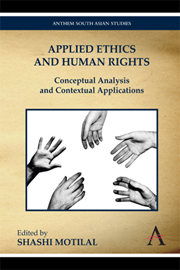Book contents
- Frontmatter
- Contents
- Preface
- Introduction
- Part One Rights, Obligations and Responsibilities
- Part Two Human Rights Issues
- 10 Fragile Identities and Constructed Rights
- 11 Affirmative Action: Compensation or Discrimination?
- 12 Ethics, Human Rights and the LGBT Discourse in India
- 13 Distributive Justice: Locating in Context
- 14 Punishment and Human Rights
- 15 Rights of the ‘Mad’ in Mental Health Sciences
- 16 Choice, Life and the (m)Other: Towards Ethics in/of Abortion
- 17 The Nationalist Project and the Women's Question: A Reading of The Home and the World and Nationalism
- 18 On the Idea of Obligation to Future Generations
- 19 Morality in Cyberspace: Intellectual Property and the Right to Information
- 20 Violence – A Right to the Survival of the Self?
- 21 ‘Moral Obligation’ to Fight for the Prevention of Greater Calamity: A Debate between Sādharana Dharma and Sva Dharma
- 22 Globalisation and Human Rights
- Notes on Contributors
10 - Fragile Identities and Constructed Rights
from Part Two - Human Rights Issues
Published online by Cambridge University Press: 05 March 2012
- Frontmatter
- Contents
- Preface
- Introduction
- Part One Rights, Obligations and Responsibilities
- Part Two Human Rights Issues
- 10 Fragile Identities and Constructed Rights
- 11 Affirmative Action: Compensation or Discrimination?
- 12 Ethics, Human Rights and the LGBT Discourse in India
- 13 Distributive Justice: Locating in Context
- 14 Punishment and Human Rights
- 15 Rights of the ‘Mad’ in Mental Health Sciences
- 16 Choice, Life and the (m)Other: Towards Ethics in/of Abortion
- 17 The Nationalist Project and the Women's Question: A Reading of The Home and the World and Nationalism
- 18 On the Idea of Obligation to Future Generations
- 19 Morality in Cyberspace: Intellectual Property and the Right to Information
- 20 Violence – A Right to the Survival of the Self?
- 21 ‘Moral Obligation’ to Fight for the Prevention of Greater Calamity: A Debate between Sādharana Dharma and Sva Dharma
- 22 Globalisation and Human Rights
- Notes on Contributors
Summary
This postmodern essay is tinged with remnants of a modern nostalgic hankering to examine whether an attempt to see how things hang together can still succeed. In this self-reflexive journey multiple narratives encrusted with the formal structure of essay writing have been replaced with an attempt at genre splicing. There is a deliberate suspension of judgement and no claim to transcendence. However, this postmodern character in certain places gives way to the modern seeking of patterns of explanation.
In the second half of the twentieth century philosophical discussions were marked by intense debates, involving Russell, Strawson, Searle, Wittgenstein, Kripke, Swinburne, Brody and many others, on the question of identity. The principle questions were: What is identity? Who is a person? What is the epistemic logical status of identity statements? And the responses, with reference to Cartesian, Kantian and Rawlsian theoretical frameworks, range from some philosophers saying that to be a person is to be a body to some maintaining that to be a person is to be a mind with others held that it is a combination of the two. Some argued that a person is a stream of consciousness and some more formally maintained only that to be a person is to be a bearer of M and P predicates. Some other philosophers have argued that a person is an animal with self-awareness and memory, endowed with the capacity to use language.
- Type
- Chapter
- Information
- Applied Ethics and Human RightsConceptual Analysis and Contextual Applications, pp. 129 - 138Publisher: Anthem PressPrint publication year: 2010



